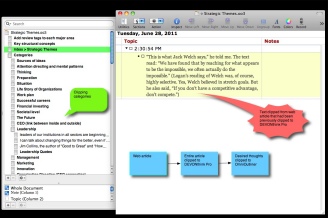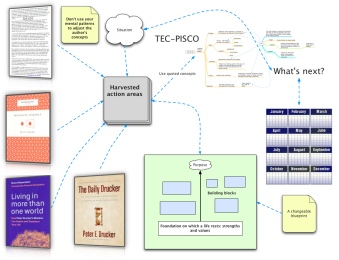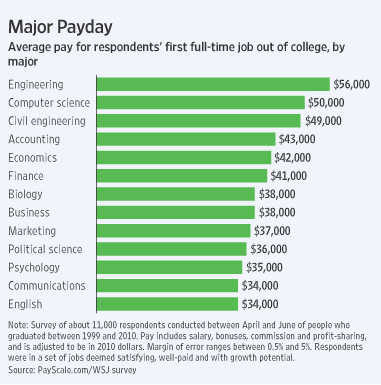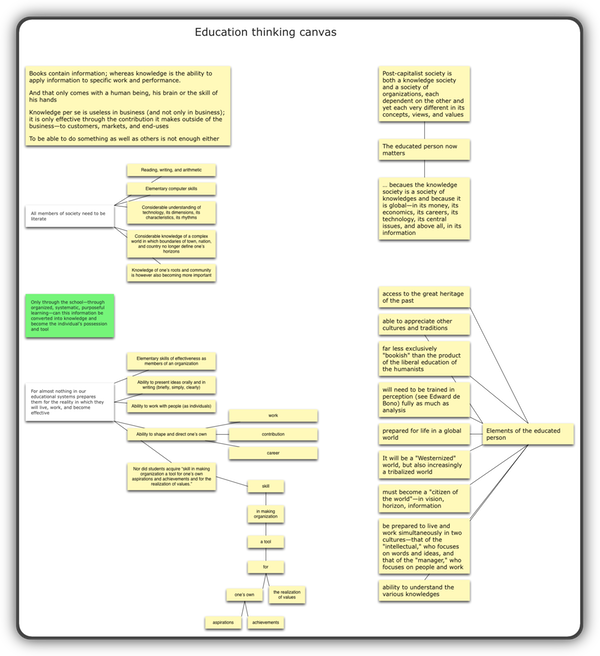As an Amazon Associate I earn from qualifying purchases #ad
![]()

![]()
Early career WORKThink of this page as a career shopping mall. You should be looking for the elements you want in your future life.
This page is meant to be used to create a career "radar" list with topics, timing, dependencies and importance. More on this below. This is relevant to anyone who wants more than a routine job in a dying organization.
If you have an Internet identity, make sure it paints a positive, constructive picture. Otherwise it will be used against you. Cleaning up your online identity or reputation
Major reality check: There are over seven billion people on the planet and almost none of them care about your career thinking—delusions. They care about themselves. Their question throughout your life will be: "what are you going to do for me tomorrow?" — what you did yesterday carries little weight. They behave just like you do—as a consumer. They move on when it suits their interests—just like you. This is a part of a foundation for career understanding and action. The work on this page will help you get organized for this reality.
This page focuses on careers over a life time—a longer and different view than jobs. It is different from occupation titles. There are people who use their work lives to create a good, meaningful life for themselves — more and different from just a good paying job. This is not something you can do once and then live happily ever after — that only happens in fairy tales.
It is not possible to work on things or draw on things that aren't on your radar. This page is meant to be used as a conceptual landscape, systematic brainroad SM and time-investment menu. To perform this brainroad function requires an introduction to a broad range of topics and quite a few sidebars (through indentation) that add breadth or elaboration to a topic.
This page looks down the road ahead of you (2015, 2020, 2030 …), not the road behind us. The content of this page will be useful to anyone at any age. It provides a foundation for managing oneself for life. It provides information for working on the question: "Where do I (as a unique individual) belong?"
This page is an attention-directing tool — click now.
Working on this page presents a challenge, but that is the nature of the world you should be preparing yourself to enter or participate in—it is not sanitary like school. It may take months to harvest and organize the ideas you want to pursue. The page's purpose is to help you create a valuable launching pad for the rest of your life. The term "launching pad" has special significance. It is chosen in preference to the word "foundation." This distinction is explained further down this page—in several places. This page provides a work-life landscape view, links to conceptual resources, and suggested tools for harvesting and organizing those resources. In other words it performs the function of a menu. This allows you to pick what fits you. These are part of the building blocks of your future life and careerS. This page provides a foundation for future directed decisions. Part of that foundation is the understanding of the launching pad idea above. The title of this page is early career WORK. This means finding important concepts, harvesting, organizing, acting, reflecting, rethinking, reflecting, more finding, harvesting … etc. This work should never stop—it is a part of navigating your life. If you are not willing to do this work, you will end up a "cog" in somebody else's "scheme" and be manipulated by somebody who doesn't care about you. The page is a work approach blueprint that will take your brain to places it wouldn't go otherwise. No one—regardless of intelligence—can invest time in opportunities that aren't on their radar. Most people's radar is filled with yesterday—it couldn't be otherwise. The brain is a history library that has to run in the future tense. Getting the right stuff on one's radar is only the first step—and a repeated challenge. I strongly suggest that you read through this entire page before clicking links except the ones in this paragraph. It would be a good idea to have some kind of structured note-taking system for harvesting and organizing ideas on this and its linked pages. I'm a Mac user. I personally use OmniOutliner Pro, MindNode Pro (there is a free non-pro version), Scrivener, and DEVONthink Pro. Unless you need a heavy article archiving solution, Scrivener should do the job (there's a Windows version). Also see specialized knowledge now. |


Career and Life Guidance from Peter Drucker
is attention-directing work
|
Thoughts on interesting topics you encounter during a day: As you're going through your day, it is a good idea to make note of any moderately interesting topic and where you discovered it. Later you can review these and archive those that don't seem valuable. The purpose of these notes is to help you look out the window. They are attention-directing tools. So pay attention to what catches your attention—it may mean something later on. Beware of the futility of politics, predictions of the future, and things that look like they are going to be big.
|
The Road Ahead
Career Directions IAt age 20 a person can anticipate a 50-60-70 year work life. It pays to be informed on the nature the work challenges ahead. It pays to make the right foundational work decisions early on. |

|
Career RoadsThere are two modern, attractive career roads that are available in reasonable quantities: knowledge technologist and knowledge worker. The remainder of this page applies primarily to knowledge workers. |
|
After looking at the illustration above in its simple form, you could mentally rearrange into the following sequence: Sectors > then Organizations that make up a sector > then a Work type branch > then the branches of the "Every organization" node> has Worker types. The sequence you've just configured is a tentative future career road.
The world of work depicted above takes place in the real physical world. You might find it interesting to get a list of the world's largest population centers and visit them in Google Maps or Google Earth's street view. Also check out their skylines. A view of the earth at night indicates the spread of electrification and the potential for modern electronics. We now have a foundation for thinking about formal education. Part of the foundation for the world you'll be entering later. Formal EducationIf you are in college or thinking about attending college:
|

Self Education
Career Directions II:
The more a person knows, about the world, its complexities and its changing nature the better able they are to navigate. They also need some personal and individual conceptual tools to help navigate along the way—those tools are here (either directly or through links—the ones I like the best are marked with the following symbol:
… Effective executives know that
Time is also a unique resource.
The supply of time is totally inelastic.
Time is totally irreplaceable.
— The Effective Executive preface by Peter Drucker
Before proceeding further, please review the previous Effective Executive link
“Concentration — that is, the courage to impose on time and events his own decision as to what really matters and comes first — is the executive’s only hope of becoming the master of time and events instead of their whipping boy” — The Effective Executive contents
“Follow effective action with quiet reflection.
From the quiet reflection will come even more effective action.” — Peter Drucker
These ideas about WHAT we spend our time doing have major strategic implications for individuals, organizations, and society.
Organization efforts: problems or opportunities
One of Drucker's favorite sayings: Focus, Focus, Focus. (See How Drucker taught me to focus by Shao Ming Lo)
Different thoughts for different times
According to Peter Drucker, "Leaders in every single institution and in every single sector … have two responsibilities.
They are responsible and accountable for the performance of their institutions, and that requires them and their institutions to be concentrated, focused, limited.
They are responsible also, however, for the community as a whole."
… As we get older we acquire roles and the expectations that come with those roles. This requires the right preparation!!!
… A knowledge worker becomes obsolescent if he or she does not go back to school every three or four years. This not only means that the equipment of learning, of knowledge, of skill, of experience that one acquires early is not sufficient for our present life time and working time.
… People change over such a long time span. They become different persons with different needs, different abilities, different perspectives, and, therefore, with a need to "reinvent themselves" for the second half of their lives.
Concepts presented in the mindmaps above were harvested from Management, Revised Edition by Peter Drucker. The educated person can be found in chapter 48 and also in the final chapter of Post-Capitalist Society. Near the very end of these chapters: "One thing we can predict: the greatest change will be the change in knowledge—in its form and content; in its meaning; in its responsibility; and in what it means to be an educated person."
This section started with a quotation on time. Everything that followed also involved time.
Again, before exploring the following resources, you might want to set up an action oriented note taking system—something you can calendarize. Also see harvesting and implementing
Attention (just the first few paragraphs for now), the patterning system of the brain (a basic human understanding—just the first couple of sections), why we need new thinking about thinking and what thinking habits, tools etc. make your life better, easier …
The conceptual resources that follow are attention-directing tools. They provide a way to force yourself to see the complex evolving landscape in which we are all embedded.
Career / life vision guidance from Peter Drucker — extremely, extremely, extremely valuable attention-directing concepts and ideas from a long-term standpoint.
Managing Oneself (for the time being: familiarity with the existence of the work blueprint)
The Effective Executive (a major radar blip)
A Class With Drucker: The Lost Lessons of the World's Greatest Management Teacher (scan the chapter titles)
The Drucker Lectures: Essential Lessons on Management, Society, and Economy (scan the chapter titles)
Mastery (an alternate world view from The Effective Executive above)
The First 90 Days: Critical Success Strategies for New Leaders at All Levels (awareness—nobody could really do all of this. See People decisions and My Life as a Knowledge Worker for alternatives.)
What Got You Here Won't Get You There by Marshall Goldsmith (awareness of bad work place behaviors to avoid)
Reality Check by Guy Kawasaki (a broad landscape view of potential time investments and areas of work). Mr. Kawasaki has a product driven, inside-out world view—so beware.
Mojo by Marshall Goldsmith (mental health for those who don't manage themselves for effectiveness)
Management and Leadership (major radar blips)
The Definitive Drucker (major radar blip)
Marketing (major radar blip)
Innovation (super, major radar blip)
Start-up planning (Is this a radar blip for you?)
The Second Half of Your Life (major radar blip)
Getting Things Done — Project Planning by David Allen (a systematic tool)
Life Design > Happiness: There are a lot of different views. Try a Google search. See The Happiness Purpose and H+ (Plus) A New Religion?: How to Live Your Life Positively Through Happiness, Humour, Help, Hope, Health (radar blips)
Generic list of concepts that have become such buzz words that they have lost their intended meaning (Important to scan the list). The page on communications is very important.
Peter Drucker was famous for his one-liners. He had the amazing ability to sum up complex ideas in a sentence or two. Unfortunately these were buried in his writing or not there at all—he had a different purpose when he was writing. You can find some of these by Googling: Drucker quotes. You'll get lots of hits. These quotes—epigrams—can be helpful in seeing the road ahead from a different angle.
The Future That Has Already Happened (super, major radar blip)
Outline of Drucker's work (a shopping center for time investments)
If you followed my page work approach suggestion at the beginning, its time to go back and explore the links plus taking structured notes (outlines)—in many cases you may just want to note the existence of a topic so you can revisit at a later date (you'll need to set up a reminder). See Dense reading and Dense Listening
After your exploration there are some "tools" and topics that will be very useful in your immediate journey ahead.
Tools for thinking through questions and projects
Topics
Your objective: Let people know you can make a valuable contribution to the things they want to do.
Think through job search elements other than networking (my delicious tag)
Prepare for actual working life
Ten or So Things to Learn This School Year
In Management, Revised Edition, look at the chapter outlines for the following topics:
25 Management by Objectives and Self-Control: The Manager's Letter (under the "How Should Objectives Be Set and By Whom?" heading)
19 Managing the Work and Worker in Knowledge Work
26 From Middle Management to Information-Based Organizations
31 Controls, Control, and Management
33 Information Tools and Concepts
42 Alliances
Part X: New Demands on the Individual
Prepare for spotting and exploiting the unexpected success—so you can run with it in a way that fits you. Think through how you might calendarize this—could be something you look for daily or constantly.
Cycling through The Daily Drucker a couple of times before graduation will provide a valuable foundation for your future directed decisions.
Having come this far you should try to identify the ideas that will shape your early career horizon.
The more realistic the better. You're entering a competitive world—try to build on your strengths and values.
Hopefully you have some outline notes that you can structure and use as reminders.
Now its time to develop a horizon that you will be traveling toward.
One way of thinking about this is to revisit the career roads illustration above and chart your path through the various options—starting with sectors.
You need to have a plan B and a plan C and maybe a plan D. Using the "CoRT 1" tools described in Teach Yourself to Think will help.
It would be a good idea to scan through some career articles as a reality check. You can harvest key words from these articles to use in further Google searches.
Everything you've explored can be a resource for your journey
Next you should be able to start formulating your career implementation project. You need to figure out what really big ideas you want on your radar and the major work areas. You just want to make sure you're headed in the right direction for you and society. This is the practical stuff in finding work. Constantly test your conclusions against new information your acquire.
I'm sure it would be a good idea to regularly retrace your steps through this page. Reading Management Cases and Adventures of a Bystander will also broaden your horizons
Start looking for the other things you need to learn to do—to be able to perform in what you are primarily trying to do
A few years further down the road, start seriously working on self-development, "Managing Oneself" and maybe "Managing Oneself for Effectiveness." Somewhere along the way it would be a good idea to review the entire chapter list in Management, Revised Edition—what else needs to be on your radar. Make a difference. Ultimately consider "what do you want to be remembered for?"
Managing Oneself mind map
Self-development tasks
Having a reputation for performance is a valuable life-long asset and that's where Managing Oneself comes in—dissect it, harvest and calendarize. Also try to navigate to an organization where your knowledge specialty has career path to top management — this is the place your contribution will be the most valuable.
Consider (do a PMI) an affiliation with a professional employee organization (PEOs) or business processing organization (BPOs). 15 May — The Daily Drucker
Simultaneously: 19 SEP—A Noncompetitive Life in The Daily Drucker. Also
A knowledge worker becomes obsolescent if he or she does not go back to school every three or four years
From The Individual In Entrepreneurial Society
One implication of this is that individuals will increasingly have to take responsibility for their own continuous learning and relearning, for their own self-development and for their own careers. They can no longer assume that what they have learned as children and youngsters will be the "foundation" for the rest of their lives. It will be the "launching pad"—the place to take off from rather than the place to build on and to rest on. They can no longer assume that they "enter upon a career" which then proceeds along a pre-determined, well-mapped and well-lighted "career path" to a known destination—what the American military calls "progressing in grade." The assumption from now on has to be that individuals on their own will have to find, determine, and develop a number of "careers" during their working lives.
And the more highly schooled the individuals, the more entrepreneurial their careers and the more demanding their learning challenges. The carpenter can still assume, perhaps, that the skills he acquired as apprentice and journeyman will serve him forty years later. Physicians, engineers, metallurgists, chemists, accountants, lawyers, teachers, managers had better assume that the skills, knowledges, and tools they will have to master and apply fifteen years hence are going to be different and new. Indeed they better assume that fifteen years hence they will be doing new and quite different things, will have new and different goals and, indeed, in many cases, different "careers." And only they themselves can take responsibility for the necessary learning and relearning, and for directing themselves. Tradition, convention, and "corporate policy" will be a hindrance rather than a help.
From The Drucker Lectures
This coming Saturday I will teach—I still teach all day—our advanced management program, and about half the people in it are engineers.
I asked them when we began this course a few weeks ago, "How often do you have to go back to school?"
And they said, "Every other year, at least, to keep up with the changes.
And every three or four years, we go back to relearn the basics, or we're obsolete."
And these are not high-tech people mostly.
They are mostly people in traditional industries—a lot of automotive, a lot of aviation, a lot of machine tools.
And yet this knowledge changes so fast.
And the same is true of the physician or any other knowledge worker.
I work closely with our big local hospital on the training of nurses, and they have to go back to school at least once every year for several weeks, and every three or four years for three months, or they're hopelessly behind.
This is something fundamentally new in human history.
And it means that the most important thing to learn in school is how to learn—the habit of continuous learning.
See 12 JUN — Management Education and 28 NOV — Rules for Staff People in The Daily Drucker
See Chapter 24 — Developing Management and Managers and Chapter 33 — Information Tools and Concept (Going Outside) in Management, Revised Edition
See The Educated Person above
Invest time thinking through what is learning and what you need to learn. Remember this is learning for application and life not for passing a test.
Many years ago I did corporate restructuring work. No one I ever ran across was aware of what was happening—their attention was absorbed by their routines and things they should have abandoned many years before. Task lists that just come off the top of your head or the pressure of the flow of events are a real potential danger that day-to-day experience seems to contradict. Connect, connect, connect.
The underlying theme of this site is developing a work approach that is adequate to your challenges ahead. (Calendarize all of the above that fits you)
Amazon: New and Used Textbooks
|
|
#tgd
The shift from manual workers
“Managing Oneself (PDF) is a REVOLUTION in human affairs.” …
“More than anything else,
“Making a living is no longer enough
These pages are attention directing tools
What’s the next effective action on the road ahead
It’s up to you to figure out what to harvest and calendarize It may be a step forward to actively reject something (rather than just passively ignoring) and then working out a plan for coping with what you’ve rejected.
Your future is between your ears and our future is between our collective ears — it can’t be otherwise.
To create a rlaexp.com site search, go to Google’s site ↓ Type the following in their search box ↓ your search text site:rlaexp.com
#z98 Copyright 1985 through 2025 © All rights reserved | bobembry bobembryusa bobembry.usa | bob embry robert embry | “BrainroadS toward TomorrowS” | “time life navigation” © #TimeLifeNavigation | “life TIME investment system” © #LifeTimeInvestmentSystem | “career evolution” © #CareerEvolution | “work-life horizons” © | “work-life evolution” © | “financial investing” © | “life design” © #LifeDesign | “organization evolution” © | #OrganizationEvolution | “brainroads toward tomorrows” © | #BrainroadsTowardTomorrows | “foundations for future directed decisions” © | #FoundationsForFutureDirectedDecisions | #rlaexpdotcom © | rlaexpdotcom © #rlaexp.com = rla + exp = real life adventures + exploration or explored exploration leads to explored Examples ↑ can be found through web searches, Wikipedia,
Some ecological and time awareness ↓ → Ken Burns films
The Über Mentor
#mlp ↓ #z99 |
As an Amazon Associate I earn from qualifying purchases